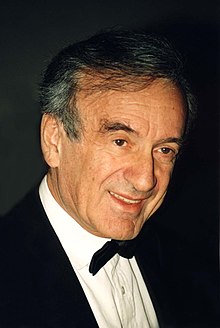
Elie Wiesel
We found 20 free papers on Elie Wiesel
Essay Examples
Overview
Dawn by Elie Wiesel
Elie Wiesel
Ghost
Chapter 1 Takes place in Palestine. Tomorrow, the narrator is conscious that he must end someone’s life. While unaware of the person’s identity, the task itself is well-known. The individual destined to die is an Englishman, and their impending death stems from a war. Curiously enough, this particular Englishman is also a beggar who played…
Rhetorical Analysis of Night by Elie Wiesel
Elie Wiesel
In Night, a novel by Lie Wisest, a dark sky looms over Lie and his family. Weasel’s declaration of intolerance toward the Jewish communities denial of human did unity by the Nazi party speaks to why this book is celebrated and studied. Wisely’ firsthand d experience incarcerated in Nazi concentration camps and careful descriptions of…
Night by Elie Weisel
Elie Wiesel
Faith
God
Despair, or the loss of hope and expectation, is when one gives up and feels hopeless, lacking motivation or energy to keep trying. It commonly occurs in those who have experienced or are experiencing traumatic events. Additionally, despair can lead to a loss of identity. Elie Wiesel’s novel Night depicts this loss of hope through…
The Witness of Evil
Elie Wiesel
Night
A terrifying moment in history: The Holocaust. A single voice could speak for all those who couldn’t. A young, ordinary jewish boy, Eliezer Wiesel, is taken from his home of Sighet, Romania. He is forced to survive in multiple concentration camps throughout World War ॥. Bit by bit, starvation and sorrow became etched in the…
Theme of Holocaust in Novel “Night”
Elie Wiesel
Night
Elie Wiesel conveys that when people are in a deprivation of needs, their faith can be challenged in his novel, Night, through the use of food motifs, the allusion to the Angel of Death, and the innocent archetype. “Doubt is poison. It leads to a loss of faith in yourself, and in all that’s good…
Elie Wiesel and Malala Yousafzai Analysis
Elie Wiesel
Literature
The Nobel Prize in Literature of 1986 was awarded to Elie Wiesel for his book Night, a memoir of his time in concentration camps during the Holocaust. His acceptance speech was intended to ensure that the events of the Holocaust were not echoed in the future; that no human being would be subjected to the…
The Darkness of Night
Elie Wiesel
Night
Night, a memoir by Elie Wiesel, is critical in the perception of human suffering, as it portrays the best and the worst of humsn nature in countless ways. In his autobiography, Wiesel describes his dreadful journey during the Holocaust, yet narrates how it increased his humanity, guided him closer to his father, and conclusively brought…
Fear Paralyzes the Worth of Living
Elie Wiesel
Night
“The only thing there is to fear, is fear itself” by Franklin D. Roosevelt. Through the holocaust many fear on topics of death, but if one always fears looking into the future we will never be able to enjoy the present. In the novel, Night by Elie Wiesel we know the holocaust is horrific, which…
Elie Wiesel – Short
Elie Wiesel
n the Night, Elie Wiesel recalled his experiences as a young Jewish boy in a Nazi concentration camp. During his experience in the death camp, he lost his faith in God, closed to his father, and became inhumanity. First of all, he was weakened on the belief of the God due to all the evils…
Image of Auschwitz in Night by Elie Wiesel
Elie Wiesel
Night
Stuffed in cattle cars, stripped naked, hair shaved, tattooed,drenched in disinfectant. Welcome to Auschwitz. In Night, Elie Wiesel proves the jews are treated like animals till they act like them. Elie Wiesel describes how him self and other people are dehumanized slowly even though even though they might not realize it. In the beginning of night…
| born | September 30, 1928, Sighetu Marmației, Romania |
|---|---|
| died | July 2, 2016, Manhattan, New York, NY |
| description | Elie Wiesel was a Romanian-born American writer, professor, political activist, Nobel laureate, and Holocaust survivor. He authored 57 books, written mostly in French and English, including Night, a work based on his experiences as a Jewish prisoner in the Auschwitz and Buchenwald concentration camps. |
| books | Night 1956, The Night Trilogy 1962, Day 1961 |
| education | University of Paris |
| quotations | “We must always take sides. “Sometimes we must interfere. “Friendship marks a life even more deeply than love. “No human race is superior; no religious faith is inferior. “The opposite of love is not hate, it’s indifference. “Think higher, feel deeper.”,We must take sides. Friendship marks a life even more deeply than love. Without memory, there is no culture. There may be times when we are powerless to prevent injustice, but there must never be a time when we fail to protest. |
| information | Short biography of Elie WieselElie Wiesel was born on September 30, 1928, in Sighet, Transylvania, a region now located in Romania. He was the third of four children and the only son of Shlomo and Sarah Wiesel. At home, Wiesel’s family spoke Yiddish, and he also learned Hebrew from his father, who was a ritual slaughterer, teacher, and teller of Talmudic stories. General Essay Structure for this Topic
Important informationSpouse: Marion Wiesel (m. 1969–2016) Awards: Nobel Peace Prize, National Jewish Book Award for Modern Jewish Thought & Experience Siblings: Tzipora Wiesel, Beatrice Wiesel, Hilda Wiesel |

